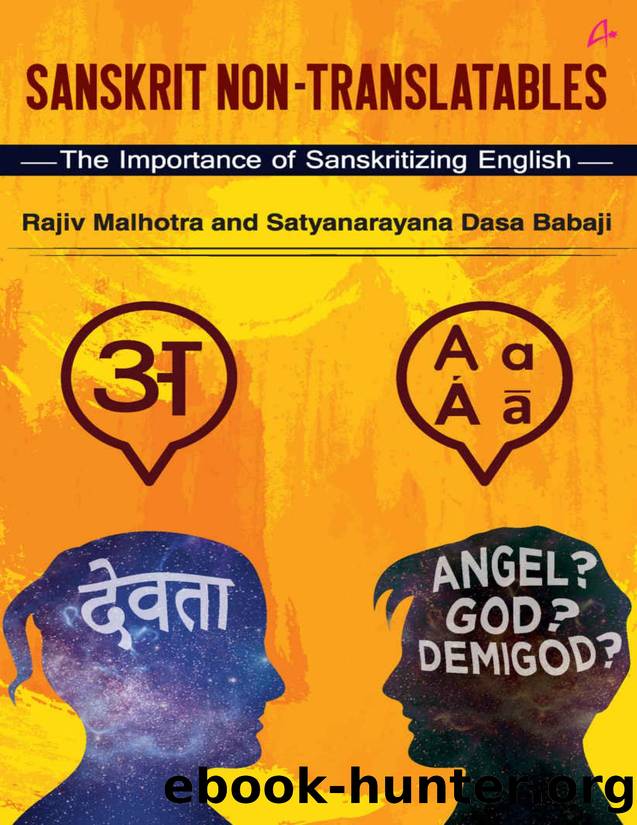Sanskrit Non-Translatables: The Importance of Sanskritizing English by Rajiv Malhotra & Satyanarayana Dasa Babaji

Author:Rajiv Malhotra & Satyanarayana Dasa Babaji [Malhotra, Rajiv]
Language: eng
Format: epub
ISBN: 9789390085484
Publisher: Amaryllis
Published: 2020-11-05T18:30:00+00:00
Another way of understanding the meaning of the word asura is in terms of a clan, a lineage or a dynasty. Purana-s recount that the revered sage, Maharishi Kashyapa had thirteen wives, two of whom were Aditi and Diti. The sons of Aditi are called aditya-s which is commonly used for the devata-s, and the sons of Diti are called daitya-s, which refers to the asura-s. Thus, the asura-s and the devata-s are born of the same father and are half-siblings. It is only due to their different behavioral characteristics that they are designated as devata-s and asura-s. This sense of lineage is not suggested by the English word demon or devil.
Although asura-s generally possess vices, there are instances when they have displayed extraordinary virtues. For example, Hiranyakashyapu was a cruel asura but his son Prahlada was just the opposite and amongst the great devotees of Bhagavan.104
Prahladaâs grandson Bali, also an asura, was a great devotee of Bhagavan as well.
Asura-s are sometimes shown to be recipients of valuable knowledge of the shastra-s. For example, the important ancient Indian astronomical text Surya Siddhanta was first revealed to an asura named Maya by Surya Bhagavan. 105 This is not the case with demons, and we do not hear of noble or righteous demons in the Judeo-Christian tradition.
The conflict between the devata-s and asura-s is also connected with the institution of yajna. 106 In Hinduism the universe is seen as a benevolent provider and a yajna is conducted to thank and give back to the cosmic process. Devata-s try to help in the yajna, and asura-s disrupt the performance of the same. This concept of yajna is not found in the Abrahamic religions and hence demons and angels cannot be distinguished on the basis of their support or opposition to yajna-s. It is thus clear that the word asura denotes a class of beings in the Hindu cosmology very different from the Judeo-Christian concept of demon or devil.
Devata-s are not Gods or Angels
The word devata is derived from verbal root div; one of the meanings of div is âto praiseâ or âadoreâ. Thus, devata-s are personalities adored and worshipped by all humans because they bring welfare to humanity. A devata is completely different from Judeo-Christian ideas of angels and gods.
Angels in Christianity and Judaism are messengers of God, that have been organized into a hierarchy based on the New Testament.
The first rung of this hierarchy is seen as servants of God and their primary role is protection and care of His throne in heaven. The concept of Bhagavan is wholly different from the idea of God, as he is transcendent and omnipresent. Bhagavan is superior to devata-s and His abode is eternal and different from svarga where devata-s reside.
Angels were created ex-nihilo by the Judeo-Christian God. In Hinduism, however, the jivatma-s, which are eternal, manifest or emanate from Bhagavan at the time of manifestation. They acquire the body of a devata, human or any other being based on their past karma-s. A jivatma with unusually good past karma-s takes on the position of Indra devata.
Download
This site does not store any files on its server. We only index and link to content provided by other sites. Please contact the content providers to delete copyright contents if any and email us, we'll remove relevant links or contents immediately.
Cultish - The Language of Fanaticism by Amanda Montell(930)
Routledge Handbook of Contemporary India by Knut A. Jacobsen(727)
My Broken Language by Quiara Alegría Hudes(668)
Istanbul by Bettany Hughes(532)
Greek and Roman Technology by Andrew N. Sherwood;Milorad Nikolic;John W. Humphrey;John P. Oleson;(521)
D. H. Lawrence and Italy by D. H. Lawrence(483)
1001 Idioms to Master Your English by drita skilja tarifa(482)
2000 Most Common Spanish Words in Context by Lingo Mastery(460)
Korean Made Simple 3 by Billy Go(457)
Orlando Furioso by Lodovico Ariosto(448)
Patria by Fernando Aramburu(442)
Korea by James Hoare(440)
How Dead Languages Work by Coulter H. George(432)
Strolling Through Rome by Mario Erasmo(429)
Learn French for Beginners - 3 in 1 Bundle: 40 Exciting French Short Stories to Easily Learn French & Improve Your Vocabulary the Fun Way by Language Learning Touri(424)
Introduction to Natural Language Processing by Jacob Eisenstein(412)
Spanish: How to Get Really Good at Spanish: Learn Spanish to Fluency and Beyond by Polyglot Language Learning(411)
Practice Makes Perfect Intermediate Spanish Grammar by Gilda Nissenberg(408)
Spanish Tales for Beginners by Various(382)
